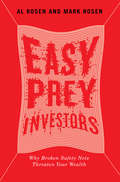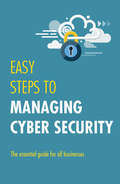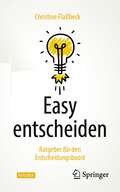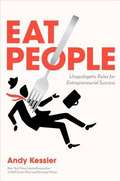- Table View
- List View
Easy Money
by Joel GibsonDiscover bill-buster Joel Gibson&’s simple money-saving system for a post-COVID world where everything is more expensive! Australian households have survived a once-in-a-century pandemic and the toughest cost of living crisis in a generation. But most of us are still paying businesses and governments hundreds or thousands more than we have to. Get some of that money back, with minimal effort, and it could be the easiest $1000+ you&’ve ever earned. Some of Joel&’s tips include: • Crucial updates on the EASIEST ways to slash energy, telco, insurance and housing costs • Simple NEW money-saving hacks for getting a better deal on groceries and petrol • How to save HUNDREDS on streaming and pay TV • How to see if you own a share of the BILLIONS in &‘free money&’ held by governments and banks Originally published as Kill Bills!, this updated and expanded edition might just make you feel good about money.
Easy Money
by Vivek Kaul"A man hears what he wants to hear and disregards the rest," wrote singer and songwriter Paul Simon some decades back. Books on the current financial crisis which started in late 2008 are a tad like that. Until now they have tended to deal with certain aspects of the crisis without looking at the bigger picture of what really went wrong. That bigger picture of the ongoing financial crisis has now started to evolve. Easy Money captures this big picture. The history of money and the financial system as it has evolved over the centuries stand at the heart of this endeavor. It explores the idea that the evolution of money over centuries has led to an easy money policy being followed by governments and central banks across the world, which in turn has fueled humongous Ponzi schemes, which have now started to unravel, bringing the whole world on the brink of a financial disaster. The book also explains how the lessons of the financial crisis have still not been learned, and in trying to deal with it, governments across the world are making the same mistakes which led to the current crisis in the first place.
Easy Money: American Puritans and the Invention of Modern Currency (Markets and Governments in Economic History)
by Dror GoldbergA sweeping history of the American invention of modern money. Economists endlessly debate the nature of legal tender monetary systems—coins and bills issued by a government or other authority. Yet the origins of these currencies have received little attention. Dror Goldberg tells the story of modern money in North America through the Massachusetts colony during the seventeenth century. As the young settlement transitioned to self-governance and its economy grew, the need to formalize a smooth exchange emerged. Printing local money followed. Easy Money illustrates how colonists invented contemporary currency by shifting its foundation from intrinsically valuable goods—such as silver—to the taxation of the state. Goldberg traces how this structure grew into a worldwide system in which, monetarily, we are all Massachusetts. Weaving economics, law, and American history, Easy Money is a new touchstone in the story of monetary systems.
Easy Prey Investors: Why Broken Safety Nets Threaten Your Wealth
by Mark Rosen Al RosenOver the past twenty-five years, a series of actions, omissions, and failures by Canada’s lawmakers and the purported gatekeepers of investors' rights have left Canadians' investments, pensions, and retirement savings at greater risk. Bodies such as provincial securities commissions have abandoned their obligations to safeguard investors and allowed published and audited financial statements in Canada to become unreliable. Yet these distorted financial statements are often used by financial analysts who present them as accurate, leaving investors in the dark about serious risks and negative impacts on their savings. In Easy Prey Investors, investigative forensic accountants Al and Mark Rosen examine the circumstances – beginning with a 1997 Supreme Court of Canada ruling that largely granted external auditors immunity against shareholder lawsuits – that have led to a proliferation of corporate scandals and other financial manipulations, and a corresponding lack of accountability among auditors. Based on their many years of experience in major Canadian court cases involving collapsed companies, the authors reveal the full stories behind the financial deceptions, and describe the disturbing consequences for investors. They show how a combination of inaction by lawmakers and illogical delegation of regulatory power to conflicted financial statement auditors has seriously harmed investors, as well as how most conventional protections have been stripped away from stakeholders. Why invest in Canada when your money can so easily be lost? Prying open doors too often sealed shut, Easy Prey Investors illuminates the unpleasant details of financial manipulation and suggests new ways to guide and protect investors and their families.
Easy Prey Investors: Why Broken Safety Nets Threaten Your Wealth
by Mark Rosen Al RosenOver the past twenty-five years, a series of actions, omissions, and failures by Canada's lawmakers and the purported gatekeepers of investors' rights have left Canadians' investments, pensions, and retirement savings at greater risk. Bodies such as provincial securities commissions have abandoned their obligations to safeguard investors and allowed published and audited financial statements in Canada to become unreliable. Yet these distorted financial statements are often used by financial analysts who present them as accurate, leaving investors in the dark about serious risks and negative impacts on their savings. In Easy Prey Investors, investigative forensic accountants Al and Mark Rosen examine the circumstances – beginning with a 1997 Supreme Court of Canada ruling that largely granted external auditors immunity against shareholder lawsuits – that have led to a proliferation of corporate scandals and other financial manipulations, and a corresponding lack of accountability among auditors. Based on their many years of experience in major Canadian court cases involving collapsed companies, the authors reveal the full stories behind the financial deceptions, and describe the disturbing consequences for investors. They show how a combination of inaction by lawmakers and illogical delegation of regulatory power to conflicted financial statement auditors has seriously harmed investors, as well as how most conventional protections have been stripped away from stakeholders. Why invest in Canada when your money can so easily be lost? Prying open doors too often sealed shut, Easy Prey Investors illuminates the unpleasant details of financial manipulation and suggests new ways to guide and protect investors and their families.
Easy Steps to Managing Cybersecurity
by Jonathan ReuvidProviding an insight to the extent and scale a potential damage could cause when there is a breech in cyber security, this guide includes case studies and advice from leading industry professionals, giving you the necessary strategies and resources to prevent, protect and respond to any threat. It covers: Introduction to cyber security, Security framework, Cyber security developments, Routing a map for resilience, Protecting financial data, Countermeasures to advance threats, Managing incidents and breaches, Preparing for further threats, and Updating contingency plans.
Easy Ways to Lower Your Taxes
by Sandra BlockReduce your taxes with great tips in plain English. While many tax books claim they can sharply reduce or eliminate your tax burden altogether, too often their dubious methods apply to nearly no one -- or their accounting schemes run the risk of drawing unwelcome IRS scrutiny. Easy Ways to Lower Your Taxes provides legitimate tactics and useful insights that can really lower your tax bill without running afoul of the IRS. Learn more about tax planning: Get a lower tax rate Boost your tax-free income Defer paying your taxes Make the most of deductions Take advantage of exemptions Identify and use credits Shift income to other taxpayers -- legally Each rule is accompanied by excerpts, strategies, ideas, and real-world examples, plus information on retirement plans, home mortgages, student loans, charitable contributions, medical expenses, dependents -- even businesses that never get started! You'll save big with the simple strategies found in Easy Ways to Lower Your Taxes.
Easy entscheiden: Ratgeber für den Entscheidungsboost
by Christine FlaßbeckMit Easy Entscheiden treffen Sie noch vor dem Lesen Ihre beste Entscheidung! Lassen Sie Ängste, Grübeleien und Unsicherheit hinter sich. Treffen Sie ab jetzt Ihre Entscheidungen mit Überzeugung! In diesem Buch wird Ihnen auf leicht verständliche Weise beschrieben, wie vielfältig Sie entscheiden können und wie ein entspannter Umgang mit dem Thema gelingt. Dr. Flaßbeck gibt Ihnen dazu mit Fachwissen und Praxiserfahrung die nötigen Werkzeuge an die Hand, mit denen Sie direkt durchstarten können. Die Autorin hat sich für das Schreiben dieses Buchs entschieden – jetzt müssen nur noch Sie entscheiden, es zu lesen und mehr Klarheit für Ihr ganzes Leben zu gewinnen! Zielgruppen: Dieser Ratgeber ist vor allem für diejenigen, die ihre eigene Entscheidungsfindung verbessern wollen. Weiterhin bietet das Werk denjenigen eine Fülle an Anregungen, die täglich andere in ihren Entscheidungen unterstützen: sei es als Coach oder Trainer_in, Assistenz, Führungskraft, Teamkolleg_in oder von Mensch zu Mensch. Zur Autorin: Dr. Christine Flaßbeck ist Dozentin der Psychologie und selbstständig als Personal- und Organisationsentwicklerin. In Coachings und Trainings hilft sie Menschen u.a. dabei, sich gut und gerne zu entscheiden.
Eat It!: The Most Sustainable Diet and Workout Ever Made: Burn Fat, Get Strong, and Enjoy Your Favorite Foods Guilt Free
by Jordan Syatt Michael VacantiForeword by Gary VaynerchukGary Vaynerchuk's personal trainers explain how you can enjoy your favorite foods without guilt while losing weight, getting stronger, and improving your health.Some “experts” say, Don’t eat carbs because insulin makes you fat. Other “experts” say, Don’t eat fat because fat makes you fat. Others say, Don’t eat protein because protein makes you fat. Some even say, Don't eat fruit because sugar makes you fat. So the logical conclusion would be not to eat anything at all . . . except for the other “experts” who say that makes you fat because it's starvation mode.Who should you believe? Who is right? Who is an ignoramus? And who is just trying to make a quick buck? It’s confusing and difficult to know who to trust, but by the end of this book you’ll realize you don’t need to eliminate anything from your diet. You can enjoy all your favorite foods (in moderation) while losing fat and achieving your goals.The issue is the “in moderation” bit. That’s not a fun or sexy sell. And most people are far less likely to spend their money on “moderation” when a half-naked Instagram influencer is advertising that you can lose 50 pounds in 24 hours while stuffing your face full of cake! That said, considering you’ve got this book in your hands, you must be tired of the lies and deception in fitness marketing and are ready to understand the truth.Let’s dive in.
Eat People
by Andy KesslerHow entrepreneurs find the next big thing-and make it huge. The era of easy money and easy jobs is officially over. Today, we're all entrepreneurs, and the tides of change threaten to capsize anyone who plays it safe. Taking risks is the name of the game-but how can you tell a smart bet from a stupid gamble? Andy Kessler has made a career out of seeing the future of business, as an analyst, investment banker, venture capitalist, and hedge fund manager. He evaluated the business potential of the likes of Steve Jobs and Michael Dell before they were Steve Jobs and Michael Dell. His eye for what's next is unparalleled. Now Kessler explains how the world's greatest entrepreneurs don't just start successful companies-they overturn entire industries. He offers twelve surprising and controversial rules for these radical entrepreneurs, such as: Eat people: Get rid of worthless jobs to create more wealth for everybody Create artificial scarcity for virtual goods Trust markets to make better decisions than managers Whether you're at a big corporation or running a small business, you're now an entrepreneur. Will you see change coming and grab on to opportunity or miss the boat?
Eat Shop Save: 8 Weeks to Better Health
by Dale Pinnock* Accompanies the new 4 part ITV series August 2019 * Sunday Times Bestseller EAT SHOP SAVE is the ITV phenomenon helping families across the UK to get seriously fitter, healthier and richer. In this 8-week healthy-eating plan to accompany the hit TV series, you'll find 80 brand-new recipes, as well as simple weekly meal planners to help you achieve and maintain a healthy lifestyle. Award-wining chef and qualified nutritionist Dale Pinnock will transform the way you eat forever with delicious, effortless and unbelievably affordable recipes.Crammed with nutritional facts, creative twists and time-saving tips - you'll feel fantastic and save hundreds of pounds along the way! REALISTIC RECIPES FOR EVERYDAY FAMILIESGUARANTEED TO SATISFY EVEN THE HUNGRIESTFUSSIEST, BUSIEST EATERSKEEP UP THE RESULTS FOR LIFE
Eat Shop Save: 8 Weeks to Better Health
by Dale Pinnock* Accompanies the new 4 part ITV series August 2019 * Sunday Times Bestseller EAT SHOP SAVE is the ITV phenomenon helping families across the UK to get seriously fitter, healthier and richer. In this 8-week healthy-eating plan to accompany the hit TV series, you'll find 80 brand-new recipes, as well as simple weekly meal planners to help you achieve and maintain a healthy lifestyle. Award-wining chef and qualified nutritionist Dale Pinnock will transform the way you eat forever with delicious, effortless and unbelievably affordable recipes.Crammed with nutritional facts, creative twists and time-saving tips - you'll feel fantastic and save hundreds of pounds along the way! REALISTIC RECIPES FOR EVERYDAY FAMILIESGUARANTEED TO SATISFY EVEN THE HUNGRIESTFUSSIEST, BUSIEST EATERSKEEP UP THE RESULTS FOR LIFE
Eat Shop Save: Recipes & mealplanners to help you EAT healthier, SHOP smarter and SAVE serious money at the same time
by Dale Pinnock**THE SUNDAY TIMES BESTSELLER**Television tie-in Eat Shop Save contains over 80 recipes to restore sanity to the challenges of family cooking!Focusing on the time-poor in particular, these delicious meals will put a smile on the fussiest of eaters and entice families with chapters such as: Quick After Work Suppers, Favourites with a Facelift and Something Sweet (but good for you).Food is just the beginning. Using smart shopping and meal planning as a basis, you'll find tips to get organised, save money and free up precious time. - Weekly meal planners in each chapter help you save money- Make your own quicker, healthier 'takeaways'- Hide vegetables for fussy eaters- Become a smart shopper- Upcycle leftover ingredients - Give classic dishes a facelift
Eat Shop Save: Recipes & mealplanners to help you EAT healthier, SHOP smarter and SAVE serious money at the same time
by Dale PinnockTelevision tie-in Eat Shop Save contains over 80 recipes to restore sanity to the challenges of family cooking.Focusing on the time-poor in particular, these delicious meals will put a smile on the fussiest of eaters and entice families with chapters such as: Quick After Work Suppers, Favourites with a Facelift and Something Sweet (but good for you).Food is just the beginning. Using smart shopping and meal planning as a basis, you'll find tips to get organised, save money and free up precious time. - Weekly meal planners in each chapter help you save money- Make your own quicker, healthier 'takeaways'- Hide vegetables for fussy eaters- Become a smart shopper- Upcycle leftover ingredients - Give classic dishes a facelift
Eat Sleep Work Repeat: 30 Hacks for Bringing Joy to Your Job
by Bruce Daisley“An important reminder of simple everyday practices to improve how we all work together, which will lead to greater team and individual happiness and performance. Great results will follow.”—Jack Dorsey, CEO of Twitter and Square“With just 30 changes, you can transform your work experience from bland and boring (or worse) to fulfilling, fun, and even joyful.”—Daniel Pink, author of When and DriveThe vice president of Twitter Europe and host of the top business podcast Eat Sleep Work Repeat offers thirty smart, research-based hacks for bringing joy and fun back into our burned out, uninspired work lives.How does a lunch break spark a burst of productivity? Can a team’s performance be improved simply by moving the location of the coffee maker? Why are meetings so often a waste of time, and how can a walking meeting actually get decisions made?As an executive with decades of management experience at top Silicon Valley companies including YouTube, Google, and Twitter, Bruce Daisley has given a lot of thought to what makes a workforce productive and what factors can improve the workplace to benefit a company’s employees, customers, and bottom line. In his debut book, he shares what he’s discovered, offering practical, often counterintuitive, insights and solutions for reinvigorating work to give us more meaning, productivity, and joy at the office.A Gallup survey of global workers revealed shocking news: only 13% of employees are engaged in their jobs. This means that burn out and unhappiness at work are a reality for the vast majority of workers. Managers—and employees themselves—can make work better. Eat Sleep Work Repeat shows them how, offering more than two dozen research-backed, user-friendly strategies, including:Go to Lunch (it makes you less tired over the weekend)Suggest a Tea Break (it increases team cohesiveness and productivity)Conduct a Pre-Mortem (foreseeing possible issues can prevent problems and creates a spirit of curiosity and inquisitiveness)“Let’s start enjoying our jobs again,” Daisley insists. “It’s time to rediscover the joy of work.”
Eat That Frog! Action Workbook: 21 Great Ways to Stop Procrastination and Get More Done in Less Time
by Brian TracyThe workbook version of the international bestseller helps you stop procrastinating and gives you skills to get more of the important things done. There's an old saying that if the first thing you do each morning is eat a live frog, you'll have the satisfaction of knowing you're done with the worst thing you'll have to do all day. For Brian Tracy, eating a frog is a metaphor for tackling your most challenging task—but also the one that can have the greatest positive impact on your life. Eat That Frog! shows you how to organize each day so you can zero in on these critical tasks and accomplish them efficiently and effectively. The core of what is vital to effective time management is: decision, discipline, and determination. This workbook puts the ideas of the original book into action. By following the same twenty-one-chapter format as the book, each chapter includes exercises for you to reflect on your own habits. You'll also learn through the experience of a narrative character who is struggling with procrastination in her work and home life and uses Eat That Frog! to improve her time management performance. Praise for Brian Tracy: &“Personal success and Brian Tracy are synonymous. Nobody I know can teach you more about how to succeed and achieve than Brian. He makes the case clearly and then proves it with his own remarkable life. If he recommends it, do it. He knows what he&’s talking about.&” –Jim Cathcart, author of The Acorn Principle
Eat That Frog! Third Edition: 21 Great Ways to Stop Procrastinating and Get More Done in Less Time
by Brian TracyAchieve work-life balance by conquering procrastination and get your most important work done, now with new chapters on technology and maintaining focus The fully revised and expanded edition of the global bestseller with over 3 million copies sold world-wide The saying goes: if the first thing you do each morning is eat a live frog, then you're done with the toughest thing for the day. Eating that frog means tackling your most challenging task-and it's also the one that can have the greatest positive impact on your life. Productivity and time management coach Brian Tracy shows you how to organize each day so you can zero in on these critical tasks and accomplish them efficiently and effectively. The 3 essentials of successful time management are decision, discipline, and determination, and Tracy shows you how to dial in these skills using 21 principles and techniques like: Single handle every task Upgrade your key skills Identify your key constraints Put the pressure on yourself Slice and dice the task This life-changing manual will ensure that you get more of your important tasks done today.
Eat That Frog!: 21 Great Ways to Stop Procrastinating and Get More Done in Less Time
by Brian TracyThe legendary Eat That Frog! (more than 450,000 copies sold and translated into 23 languages) provides the 21 most effective methods for conquering procrastination and accomplishing more.
Eat That Frog: Snapshots
by Brian TracyThe motivational classic with more than 1.5 million copies sold will help you stop procrastinating and get more of the important things done—today! There just isn&’t enough time for everything on our to-do list—and there never will be. Successful people don&’t try to do everything. They learn to focus on the most important tasks and make sure those get done. They eat their frogs. There&’s an old saying that if the first thing you do each morning is eat a live frog, you&’ll have the satisfaction of knowing you&’re done with the worst thing you&’ll have to do all day. For Tracy, eating a frog is a metaphor for tackling your most challenging task—but also the one that can have the greatest positive impact on your life. Eat That Frog—Snapshots shows you how to organize each day so you can zero in on these critical tasks and accomplish them efficiently and effectively. In this fully redesigned and illustrative edition, Tracy explains how you can use technology to remind yourself of what is most important and protect yourself from what is least important. But one thing remains unchanged: Brian Tracy cuts to the core of what is vital to effective time management: decision, discipline, and determination. This life-changing book will ensure that you get more of your important tasks done—today!
Eat Their Lunch: Winning Customers Away from Your Competition
by Anthony IannarinoThe first ever playbook for B2B salespeople on how to win clients and customers who are already being serviced by your competition, from the author of The Only Sales Guide You'll Ever Need and The Lost Art of Closing.Like it or not, sales is often a zero-sum game: Your win is someone else's loss. Most salespeople work in mature, overcrowded industries, your offerings perceived (often unfairly) as commodities. Growth requires taking market share from your competitors, while they try to do the same to you. How else can you grow 12 percent a year in an industry that's only growing by 3 percent?It's not easy for any salesperson to execute a competitive displacement--or, in other words, "eat their lunch." You might think this requires a bloodthirsty "whatever it takes" attitude, but that's the opposite of what works. If you act like a Mafia don, you only make yourself difficult to trust and impossible to see as a long-term partner. Instead, this book shows you how to find and maintain a long-term competitive advantage by taking steps like: * ranking prospective new clients not by their size or convenience to you, but by who stands to gain the most from your solution. * understanding the different priorities for everyone in your prospect's organization, from the CEO to the accountants, and addressing their various concerns. * developing a systematic contact plan for all those different stakeholders so you can win over the right people at the organization in the optimal sequence.Your competitors may be tough, but with the strategies you'll discover in this book, you'll soon be eating their lunch.
Eat What You Kill: Becoming a Sales Carnivore
by Sam TaggartFrom the founder and CEO of multimillion dollar sales empire D2D Experts, a battle guide to closing more deals than you ever thought possible.Just ten years ago, Sam Taggart was beating the streets as a door-to-door salesman selling solar and alarm systems, getting thousands of doors slammed in his face – and worse – every day. Now, Sam is the founder and CEO of D2D Experts, a seven-figure sales empire that offers training to an active userbase of 30,000 members. Eat What You Kill is the key to mastering the art of sales - and it all starts with a simple mindset shift.In this practical guide, Sam Taggart teaches readers to be sales carnivores – conquerors with limitless potential – instead of herbivores – victims who make excuses for their failures. No matter what you're selling or how you do it, this book is chock full of winning advice for closing every deal, such as: how to build your own pipeline instead of relying on opportunities from higher-upshow to build a healthy 'sales routine' to maximize earnings and minimize burnouthow to build bullet-proof pitches tailored to the four types of prospecthow to properly frame rejection so you don't lose steamFrom improvisational tips to take your pitches to the next level, to activating your &“prey drive&” to supercharge prospecting, Eat What You Kill is the synthesis of everything Sam Taggart has learned on his way to becoming the world&’s best salesman.
Eat What You Kill: The Fall of a Wall Street Lawyer
by Milton C. Regan Jr.He had it all, and then he lost it. But why did he do it, risking everything-wealth, success, livelihood, freedom, and the security of family? Eat What You Kill is the story of John Gellene, a rising star and bankruptcy partner at one of Wall Street's most venerable law firms. But when Gellene became entangled in a web of conflicting corporate and legal interests involving one of his clients, he was eventually charged with making false statements, indicted, found guilty of a federal crime, and sentenced to prison. Milton C. Regan Jr. uses Gellene's case to prove that such conflicting interests are now disturbingly commonplace in the world of American corporate finance. Combining a journalist's eye with sharp psychological insight, Regan spins Gellene's story into a gripping drama of fundamental tensions in modern-day corporate practice and describes in perfect miniature the inexorable confluence of the interests of American corporations and their legal counselors. This confluence may seem natural enough, but because these law firms serve many masters-corporations, venture capitalists, shareholder groups-it has paradoxically led to deep, pervasive conflicts of interest. Eat What You Kill gives us the story of a man trapped in this labyrinth, and reveals the individual and systemic factors that contributed to Gellene's demise.
Eat Your Heart Out
by Jim HightowerWhy You Are a Captive Customer!<P> Just about everything we eat is controlled by gigantic agribusiness corporations and supermarket chains whose power is almost unlmited. Jim Hightower exposes many of the outrages and abuses in Eat Your Heart Out,
Eat Your Heart Out, Victoria Chubb
by Joyce HuntIt's summer vacation at last! But Roger and his friends, Lizzie, Gina, and Buck, are bored. Then they come up with a plan. They open a business, a luncheonette for the local kids. And it's a smash hit ...until nasty Victoria Chubb shows up. Victoria is jealous of the foursome's close friendship, so she sets out to ruin their project. When the luncheonette is in real trouble, Victoria unexpectedly comes to the rescue with a great idea But Roger and his partners soon find that Victoria's good ideas may just put them out of business! Can the luncheonette survive Victoria Chubb? RL 5 8-12
Eat the Rich
by P. J. O'RourkeA humorous treatise on economics, a world tour from the 'good capitalism' of Wall Street to the 'bad capitalism' of Cuba, in search of an answer to the age-old question: Why do some places prosper and thrive, while others just suck?




















